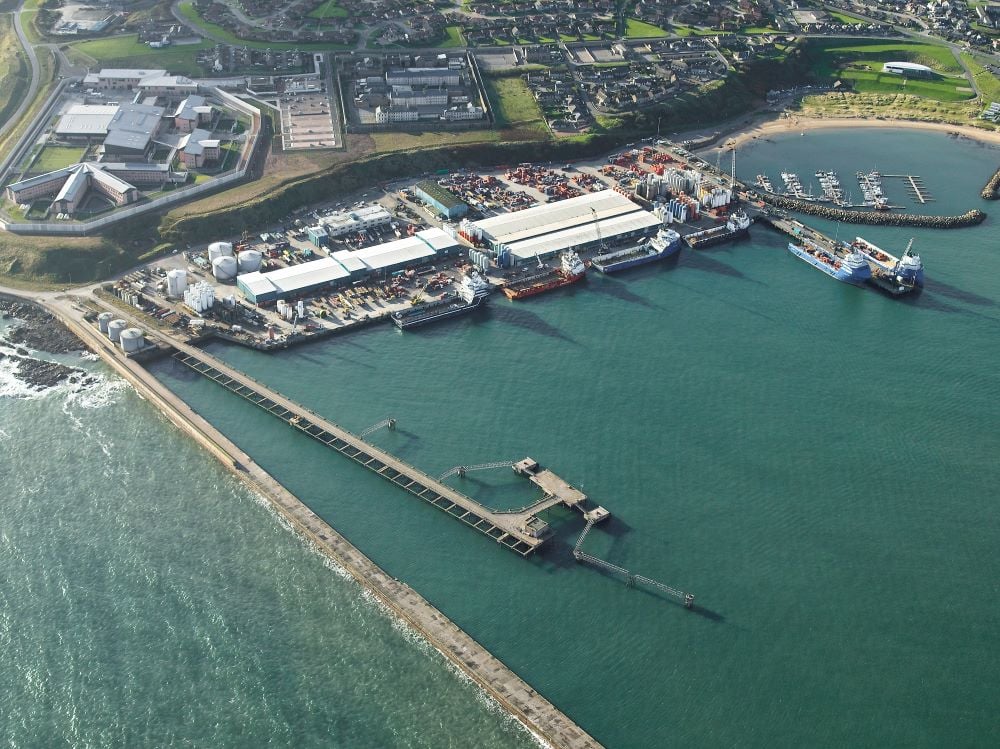UK plan for Scotland to ‘spearhead’ green energy growth ‘falls so far short’

Peterhead South Base (Image courtesy of ASCO)
Scotland could be in line for new jobs and investment after the UK Government unveiled new plans to scale up affordable, clean, homegrown power - but the strategy has been criticised for a lack of ambition or any major new announcements.
New green technologies are set to be developed and deployed in Scotland, including carbon capture usage and storage (CCUS) and hydrogen.
As part of its Powering Up Britain strategy, the UK Government is launching Track-2 of the CCUS cluster sequencing process to identify the next two CCUS clusters that will contribute to its ambition to capture 20-30 megatonnes of CO2 per year across the economy by 2030. At this stage, the government has considered the Acorn Transport and Storage System in Aberdeenshire one of the two best placed to deliver its objectives.
This announcement follows the confirmation in the Spring Budget of £20 billion for CCUS, future-proofing jobs in the industrial heartlands, including the North Sea, contributing to a half a million new green jobs set to be created and supported across the country.
Energy security secretary Grant Shapps is also launching the £160 million fund for projects to build the port infrastructure needed to support further floating offshore wind, through the Floating Offshore Wind Manufacturing Investment Scheme, with Scottish ports well placed to bid for funding. This scheme will support investment in the infrastructure needed to meet the UK’s ambition of up to 5GW of floating offshore wind by 2030, supported by a substantial pipeline of potential projects off Scotland and in the Celtic Sea.
The UK Government has set an ambition for 10GW of hydrogen production by 2030 – which could generate enough clean electricity to power all of London for a year.
Scotland has been described as central to these plans, with four of the first fifteen projects announced to be given a share of the £240m Net Zero Hydrogen Fund (NZHF) to develop new low carbon hydrogen production plants. Hydrogen will play an important role in helping intensive industries such as chemicals, steel and cement convert to using clean energy.
Measures announced this week include:
- A commitment to Carbon Capture Usage and Storage – The first projects will be announced to progress to the next stage of the negotiations to rollout the first Carbon Capture clusters in industrial heartlands. The round for areas to apply for two additional future clusters has also been launched and there will be an opportunity for further projects to be added to the first two clusters.
- Kickstarting investment into the UK’s emerging floating offshore wind industry by launching the £160m fund to support port infrastructure projects, securing the UK’s leadership in this new technology.
- Backing the first tranche of new green hydrogen production projects under the £240m Net Zero Hydrogen Fund as part of development of this new power source.
- Opening the fifth round of the UK’s scheme to incentivise investment in renewable electricity, backed by a budget of £205m. Now being held annually, Contracts for Difference will build on the UK levy-funded support for renewable power since 2010 of around £80bn.
- Announcing Great British Nuclear, will initially be led by Simon Bowen as interim chair and Gwen Parry-Jones OBE as interim chief executive officer: with GBN’s first job to launch a new competition to select the best Small Modular Reactor technologies – one of the most advanced nuclear power technologies in the world – for development by Autumn.
- Speeding up the planning process to attract investment – reforming the planning process to enable the building of more energy infrastructure including solar power and offshore wind projects more quickly.
- Cutting household bills by expanding government energy efficiency support to even more households - The Great British Insulation Scheme, a rebranded ECO+, will upgrade 300,000 of the country’s least energy efficient homes.
- Investing more than £380m into boosting EV charging points and infrastructure across the country to support the rollout of electric vehicles
- Reducing reliance on fossil fuels to heat buildings – a new £30m Heat Pump Investment Accelerator is designed to leverage £270m private investment to boost manufacturing and supply of heat pumps in the UK. The Boiler Upgrade Scheme, which offers a £5,000 grant to anyone buying a heat pump, will be extended to 2028.
- Providing UK Export Finance with an extra £10bn capacity to boost exports, including from the UK’s clean growth sectors.
- Building a stable environment for businesses to invest and grow in the transition to electric vehicles and sustainable aviation fuel.
Scotland’s winning Net Zero Hydrogen Fund (NZHF) projects are:
- Statera, based in Kintore, plan to develop a 3GW, grid connected, electrolytic hydrogen project that aims to use excess wind power in Scotland to produce low-carbon, green hydrogen and supply it to the UK’s most carbon intensive industrial clusters through existing gas transmission pipelines.
- Octopus Energy’s Lanarkshire Green Hydrogen project plans to deploy 15MW of electrolysis directly connected to an onshore wind farm, to produce over 3.5 tonnes per day of green hydrogen.
- Falck Renewables plans to develop their Knockshinnock Green Hydrogen Hub Project which will deliver one of the first fully off-grid renewable hydrogen supply systems on the mainland UK, and once operational, will supply over 160 tonnes of low-carbon hydrogen per year.
- Getech aims to build a major green hydrogen hub in Inverness that will produce, store and dispense green hydrogen, upwards of 10 tonnes a day over time.
Alongside this, five Scottish companies have been shortlisted to proceed to the next stage of the process for the first electrolytic hydrogen allocation round (HAR1) to kick start the low carbon hydrogen economy across the UK and help meet the country’s wider net zero target. These are:
- ERM Dolphyn
- Pale Blue Dot Energy
- SSE Renewables
- RES and Octopus Green Hydrogen
- Scottish Power
But not all are convinced by the revised plan, which arrives in the wake of a 2022 High Court ruling that the previous plan did not provide enough detail on plans to tackle climate change.
The Royal Institution of Chartered Surveyors (RICS) responded with disappointment and argues that the document contains little in the way of new announcements or funding.
Sam Rees, senior public affairs officer for RICS, said: “While RICS welcomes any investment in the decarbonisation of the UK, RICS is disappointed by the lack of ambition or indeed any major new announcements – especially in light of the publication of the Independent Review of Net Zero led by Chris Skidmore MP. With an estimated 15 million homes needing a form of energy efficiency improvement work, the insulation policy targeting 300,000 homes falls well short of the ambition needed.
“Powering Up Britain contained little in the way of incentives for the majority of consumers and businesses to create low-carbon, energy-efficient properties. Further expected announcements by the government look set to push back decarbonisation of the built environment, including a now 12-year phasing out of gas boilers and delays to create higher EPC-rated homes.
“RICS will continue to work with UK Government, the Energy Efficiency Taskforce and Net Zero Coalition to push for greater resources towards creating a low-carbon UK, recognising the important role surveyors have in supporting the net zero transition.”
Claire Mack, chief executive of Scottish Renewables, added: “Today’s announcements should have been a defining moment for the UK – a chance to encourage the necessary investment to deploy the renewable energy projects required to safeguard our energy security, cut bills for consumers and meet our net-zero targets. It is unacceptable that they have fallen so far short.
“Nothing announced today comes close to repairing the damage caused by recent policy decisions from the UK Government which have discouraged that investment in clean power projects at the very time the UK needs it most.
“Renewable energy projects, through the Contracts for Difference mechanism, have provided a valuable buffer from unprecedented high gas prices to avoid the need for deeper interventions from Government.
“Last year, when gas prices were at their highest, renewable energy generators paid back over £300m to consumers between July and September alone. Not only are wind and solar farms, alongside other clean power projects, now keeping the UK’s lights on, they are a central part of the country’s economy, too.
“While it is encouraging to see electricity network infrastructure being recognised as a key part of our energy transition, we will now have to wait until the summer to find out how the government intends to speed up the connection process and allow this industry to deliver for Britain.”
Launching the plan, prime minister Rishi Sunak said: “When global energy supplies are disrupted and weaponised by the likes of Putin, we have seen household bills soar and economic growth slow around the world.
“We have stepped in to shield people from its worst impacts by helping to pay around half the typical energy bill. But we are also stepping up to power Britain and ensure our energy security in the long term with more affordable, clean energy from Britain, so we can drive down energy prices and grow our economy.
“That’s why we’re driving forward plans to boost renewables, revive nuclear and build new thriving industries like carbon capture, which will in turn create good jobs across the country, provide new opportunities for British businesses at home and abroad, and maintain our world-leading action to reach net zero.”
Energy security secretary Grant Shapps said: “We have seen over the past year what can happen when global energy supplies are disrupted, and a tyrant like Putin uses energy as a weapon.
“Access to cheap, abundant and reliable energy provide the foundation stone of a thriving economy with our homes and businesses relying on it to deliver our future prosperity.”
Energy security and net zero minister Graham Stuart said: “Scotland will be at the heart of our plans to power up Britain, as we support its development of new home-grown technologies of the future.
“Today’s announcement will create opportunities for Scottish businesses to export their expertise around the world and set the standard for a clean, secure and prosperous future.”
UK Government minister for Scotland John Lamont added: “Scotland’s green energy potential is at the heart of the UK Government’s plans to deliver energy security, drive investment and grow the economy by developing clean domestic power sources.
“Every household in Scotland and across the UK have felt the impact of energy prices and that’s why the UK Government has already taken significant action to ease cost of living pressures. This new, extensive package of measures will help reduce bills in the long term.
“From the carbon capture sector where we are progressing at pace and investing up to £20 billion to help decarbonise our industries, to offshore wind, funding for low carbon hydrogen projects, and making the Contracts for Difference round an annual event, Scotland is a key part of the UK’s net zero plans and helping to boost economic growth through green jobs.”




















